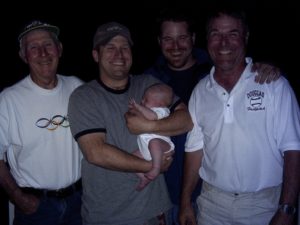“I am not writing these things to shame you, but to warn you as my beloved children. For even if you had ten thousand others to teach you about Christ, you have only one spiritual father. For I became your father in Christ Jesus when I preached the Good News to you. “I urge you, then, be imitators of me. That is why I sent you Timothy, my beloved and faithful child in the Lord, to remind you of my ways in Christ, as I teach them everywhere in every church.” 1 Corinthians 4:14-17
Last week I interrupted a three-part series on fatherly compassion, authenticity, and godly discipline. Today we will be finishing up the series. Thank for be patient with me taking the time to write about our late dog Buddy. I think I had to reflect just a little bit about him after his passing.
just a little bit about him after his passing.
We have seen how important living by example is to Paul, it is not at all surprising then to see what he says in verse 17: “…For this reason I am sending to you Timothy, my son whom I love, who is faithful in the Lord. He will remind you of my way of life in Christ Jesus, which agrees with what I teach everywhere in every church…”
Paul not only says, “imitate me” but to help them do that, since he can’t personally be there, he sends Timothy because Timothy was a living, breathing example of someone who was already doing what Paul was now instructing the Corinthians to do. He was imitating Paul.
God sent Paul as an imitation of Christ and Paul sent Timothy as an imitation of him. Sometimes we will be sent as well.
 One father had a three-year-old daughter who was having trouble sleeping through the night. She’d often wake up several times in the night because she was afraid. Each time as he re-tucked her into bed, he would remind her that Jesus was with her and he would keep her safe.
One father had a three-year-old daughter who was having trouble sleeping through the night. She’d often wake up several times in the night because she was afraid. Each time as he re-tucked her into bed, he would remind her that Jesus was with her and he would keep her safe.
Several nights in a row, she did this over and over again. Finally, one night, the dad asked her if she had prayed to Jesus to take her fear away and help her fall asleep. Oh, yes,” she assured him. “I prayed to Jesus… and He told me to go and get you!”
As imitators of Christ we will be called on often because sometimes people will need someone with skin on.
The third and final thing we are covering today is not  only a fatherly compassion, and a fatherly authenticity, but also a father’s loving discipline:
only a fatherly compassion, and a fatherly authenticity, but also a father’s loving discipline:
“Some of you have become arrogant, as if I were not coming to you. But I will come to you very soon, if the Lord is willing, and then I will find out not only how these arrogant people are talking, but what power they have. For the kingdom of God is not a matter of talk but of power. What do you prefer? Shall I come to you with a rod, or in love and with a gentle spirit?”
You notice here that Paul is displaying some righteous anger. Some people don’t understand what that means. It means being angry at what makes God angry. Not just what makes us angry. And “righteous anger” is the right word order, because God is not fundamentally angry. He is fundamentally righteous. God’s anger is a byproduct of his righteousness. Righteousness must precede anger to fulfill the admonition to “Be Angry, but sin not”. Here Paul, expressing his disappointment and showing that he is not afraid to say and do some hard things – if that becomes necessary.
 There is a story about a man is being tailgated by a woman who is in a hurry. He comes to an intersection, and when the light turns yellow, he hits the brakes. The woman behind him goes ballistic. She honks her horn at him; she yells her frustration in no uncertain terms; she rants and gestures.
There is a story about a man is being tailgated by a woman who is in a hurry. He comes to an intersection, and when the light turns yellow, he hits the brakes. The woman behind him goes ballistic. She honks her horn at him; she yells her frustration in no uncertain terms; she rants and gestures.
While she is in mid-rant, someone taps on her window. She looks up and sees a policeman. He invites her out of the car and takes her to the station where she is searched and fingerprinted and put in a cell. After a couple of hours, she is released, and the arresting officer gives her her personal effects, saying, “I’m very sorry for the mistake ma’am. I pulled up behind your car while you were blowing your horn, using bad gestures and bad language.
I noticed the ‘What Would Jesus Do?’ bumper sticker, the ‘Choose Life’ license plate holder, the ‘Follow Me to Sunday School’ window sign, the Christian fish emblem on your trunk, and I naturally assumed you had stolen the car.”
‘Choose Life’ license plate holder, the ‘Follow Me to Sunday School’ window sign, the Christian fish emblem on your trunk, and I naturally assumed you had stolen the car.”
The world gets pretty tired of people who have Christian bumper stickers on their cars, Christian fish signs on their trunks, Christian books on their shelves, Christian stations on their radios, Christian jewelry around their necks, Christian videos for their kids, and Christian magazines for their coffee tables but don’t actually have Jesus in their home or the love of Jesus in their hearts.
A person who is angry on the right grounds, against the right persons, in the right manner, at the right moment, and for the right length of time understands righteous anger.
Ephesians 6:4 warns: “Fathers, do not exasperate your children; instead, bring them up in the training and instruction of the Lord.” And. Colossians 3:21 says Fathers, do not embitter your children, or they will become discouraged.
Anger in itself is not bad, but it should be kept in the back pocket and hard to reach. There is a reason the phrase “slow to anger” is in the Bible 22 times.
Years ago I wrote a devotional entitled “Every home needs a woodshed.” It was not that I was necessarily writing about spanking, but the idea was that parents should not spank at the scene of the crime. If a child does something that requires discipline, if the punishment is handed out right on the spot, emotion not discernment may determine the harshness of the of punishment. A prayer walk to another location can often bring everything into prospective and maybe the spanking board of education may not even be necessary.
When I was coaching I would tell my assistants that they must pat a  player on the back 10 times before the coach could get into the player’s face. The coach needed to purchase the right to chastise with caring currency.
player on the back 10 times before the coach could get into the player’s face. The coach needed to purchase the right to chastise with caring currency.
In these last verses Paul shows his teeth a little bit. He is calling their bluff, by promising that he will come to see them soon. ”I will find out”, says Paul, “not only how these arrogant people are talking, but what power they have.” You know that old phrase, “Just wait till your father gets home.” That doesn’t usually mean, “because he has a half-gallon of ice cream for you.”
Well, some the godly leaders in Corinth might have said after this letter, “Wait until your father Paul get home.” Paul would be coming to them was to see if they had traded transforming Gospel power for poor worldly substitutes of Gospel power. If they have, he is prepared to take harsh measures with them. And he is prepared to do that precisely because his love for the Corinthians was real and he was prepared to show it in ways that might cause them pain.
 But that’s what love does. When that time comes, Paul will have prayed himself into a greater understanding of what discipline is needed. We can tell by the tone of this letter and all the others Paul wrote that his words were based on love.
But that’s what love does. When that time comes, Paul will have prayed himself into a greater understanding of what discipline is needed. We can tell by the tone of this letter and all the others Paul wrote that his words were based on love.
There was a young boy who had to go through some excruciating treatments to save his life and his parents and doctors explained that to the little boy. At the end of the treatment the whimpering boy looked up at the doctor and said, “Thank you, doctor, for the hurting.”
Maybe many of the Corinthians said that to Paul, maybe many of our children will say that to us someday, and maybe many of us will say that to God someday. Thank you for the hurting.
So, because Paul has a real relationship with the Corinthians, he threatens the “rod” – that is, harsh words and disciplinary actions, but hopes all the while that he will not have to use it. He knows and we should know that a relationship that cannot endure rebuke is not a relationship, it’s merely an acquaintance, masquerading as a relationship.
So he gives them the choice between harsh or gentle. We have a choice as well. Can we expect that God, who is a more loving Father than Paul, will sit idly by and watch as you and I continue down a wrong path?
a choice as well. Can we expect that God, who is a more loving Father than Paul, will sit idly by and watch as you and I continue down a wrong path?
Because he loves us, and has sent his son to save us, He will do whatever is necessary to bring us back when we stray. Sometimes it is with the rod of discipline that brings us back. And sometimes it is with the mere prospect of discipline, that calls us back.
And if we respond, we can expect that He will receive us in a spirit of gentleness.
As we disciple others, whether it is our children or someone else’s, we must partner with our heavenly Father to show compassion, authenticity, and godly discipline.
A LETTER TO DAD (author unknown)
There are so many things I’d like To tell you face to face; I either lack the words or fail To find the time and place.
But in this special letter, Dad, You’ll find, at least in part, The feelings that the passing years Have left within my heart.
The memories of childhood days And all that you have done, To make our home a happy place And growing up such fun!
I still recall the walks we took, The games we often played; Those confidential chats we had While resting in the shade.
This letter comes to thank you, and, For needed words of praise; The counsel and the guidance, too, That shaped my grown-up days.
No words of mine can tell you, Dad, The things I really feel; But you must know my love for you Is lasting, warm and real.
You made my world a better place, And through the coming years; I’ll keep these memories of you As cherished souvenirs. …
If we want to be fathers or mothers or mentors or disciple-makers we must model ourselves after our father in heaven.

